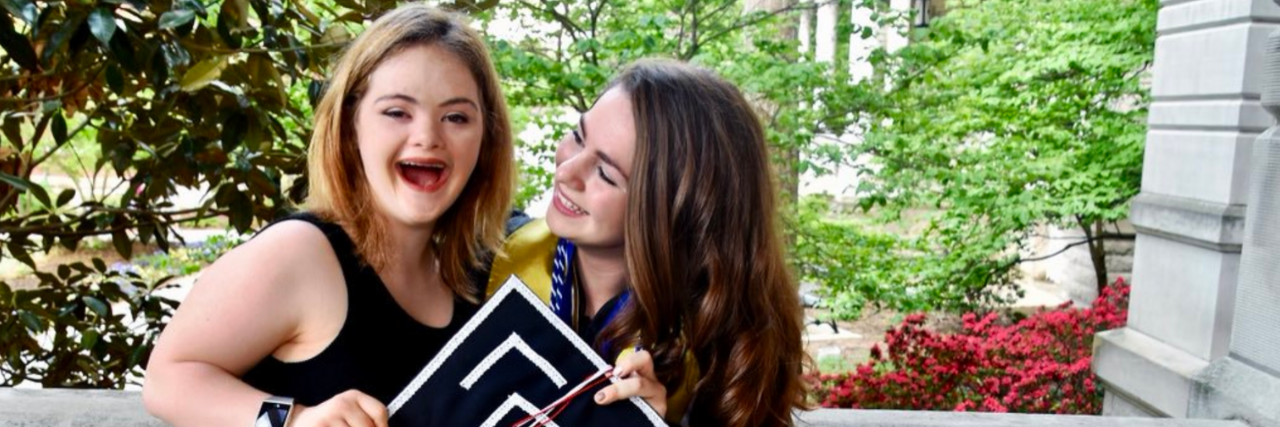University Cheerleader With Down Syndrome Denied From Every Sorority on Campus
This story has been updated with the statement from George Mason University’s Panhellenic Council.
On Sunday, 19-year-old AnnCatherine Heigl, who has Down syndrome, was released from every sorority during recruitment at George Mason University in Fairfax, Va. Her sister, Lillie Heigl, 22, posted an email she sent to Phil McDaniel, associate director of student involvement, on Twitter, expressing disappointment over her sister’s exclusion.
My sister who has Down syndrome went through @GMUPanhellenic sorority recruitment this weekend and her experienced has left her feeling unwanted and devastated. Here is my response to their Greek Life pic.twitter.com/pzNSFRz8uA
— Lillie (@lil_heigl) September 17, 2018
AnnCatherine is a sophomore and a Division I cheerleader for the university’s basketball team. According to her sister, she is the first collegiate cheerleader in the nation with an intellectual disability. She is also the first student from Indiana to take part in Mason LIFE, a post-secondary program that gives people with intellectual and developmental disabilities the opportunity to receive a university experience while also giving them the support they need to succeed. As part of her coursework, AnnCatherine has worked at a preschool and taken a variety of classes including yearbook, public speaking, and human sexuality.
“AnnCatherine has an impressive resume,” Lillie told The Mighty. “She’s done a bunch of volunteer work, she’s a D1 athlete, and I believe if you gave her resume to a typical girl, the typical girl would have gotten a bid.”
Lillie, who is studying law with an interest in disability issues, said she couldn’t believe that there wasn’t a spot for her sister in one of the university’s eight chapters when only 288 women went through recruitment.
“I felt like in a world that was not made to be inclusive to people with intellectual disabilities, once again she was excluded,” Lillie wrote.
AnnCatherine told The Mighty she wanted to be in a sorority to meet new people. She said she was crying and upset when she found out she wasn’t going to be a part of a sorority. Lillie was upset as well but also felt guilty as she had encouraged AnnCatherine to rush. Lillie helped her pick out her outfits and prepare for the often demanding recruitment process.
“She asked why no one wanted to be her sister, and my heart broke,” Lillie said. “I didn’t really know how to look at my precious and phenomenal little sister and tell her they didn’t want you because you have a disability, and I really do believe that’s what happened.”
According to Lillie and their mom, Laura Heigl, AnnCatherine’s Rho Gamma, a sorority member who separates herself from her sorority during recruitment to help potential members navigate the process, was surprised that AnnCatherine did not get a bid.
Lillie said AnnCatherine’s Rho Gamma told them her sister had been outgoing, friendly and not shy, leading Lillie to believe AnnCatherine was not given a bid solely because of her disability.
Lillie said she’s not sure she can fault the university’s Panhellenic Association as a whole because decisions to cut potential new members come from individual chapters. (The National Panhellenic Conference is the governing body over 26 sororities nationwide, but universities also have their own association.) Though it comes from each chapter, Lillie said she doesn’t think the Greek system as a whole does a great job of including people with disabilities, both intellectual and physical. She witnessed it as a Greek member while an undergraduate at the University of Missouri.
“I know it’s a consistent problem,” she said. “I would say it’s pretty safe to assume that there isn’t a lot of knowledge or education that Greek members or women doing the recruiting have about neurodiversity and about the people coming through.”
Based on her experience with Greek life, Lillie said sorority members may be told to value scholarship or women who are intellectually curious when deciding who to include in their chapter. While traditional criteria may work for people who are neurotypical, it excludes those with intellectual disabilities, she said, adding:
My sister is not going to talk to you about her favorite books. She’s just not, and that does not mean she’s not intelligent in her own way and doesn’t bring something to the table, but I don’t think there’s an appreciation for that kind of diversity and what she would bring to a chapter. I think that part is what, in my mind, falls back, on [Panhellenic Association] — both on George Mason’s campus and kind of nationally — to appreciate different kinds of diversity and in this case it would be people who are not neurotypical.
Mason LIFE reached out to AnnCatherine’s mom about what it can do in the future to better prepare students interested in Greek life. Her mother has yet to hear back from anyone in Student Involvement or Greek life.
On Wednesday, the university’s Panhellenic Council released a statement on its social media. The council said it does not have the ability to dictate a chapter’s membership or selection of new members. The council stated it promotes inclusivity and recognizes “people have been harmed by the decisions of our members, and we are committed to engaging all communities in dialogue on these issues to do better in the future.”
Panhellenic Statement on Release of MasonLife student—full statement can also be found on Facebook. https://t.co/1aovfYFOMo pic.twitter.com/CXg8a7UZRj
— Mason Panhellenic (@gmupanhellenic) September 19, 2018
The Mighty has reached out to Student Involvement and has yet to hear back.
Photo courtesy of Lillie Heigl

